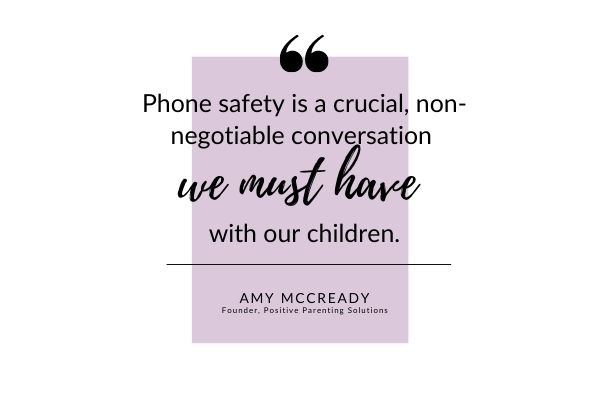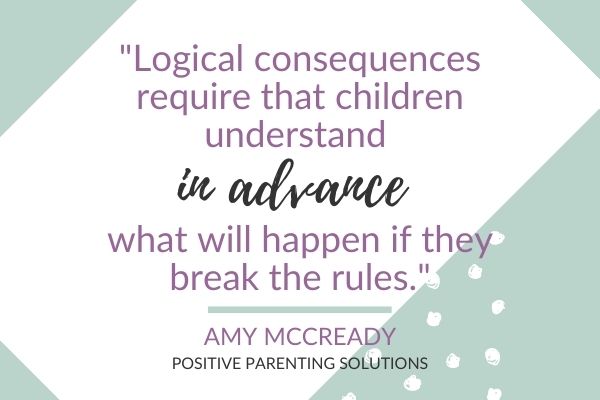What Age Should Kids Get a Phone? 4 Questions to Consider

Buying a phone is a high-dive plunge, and the risks must be weighed before we determine whether our children should jump.
It’s a bit of a Catch-22–we don’t want screen time inhibiting our kids’ social, emotional, and intellectual growth, but there are circumstances when they may actually need a phone.
There’s already plenty of evidence that phones (and more specifically, smartphones) negatively affect mental health. Still, our daily lives are built increasingly around them.
We also have to keep track of our kids–literally–and we want to give them the ability to call and text us (you know, all the time, even on dates, when they’re in college–forever).
Paving communication channels between parent and child begins by allowing kids (some) freedom of movement and choice. In fact, my FREE WEBINAR is all about recognizing our children’s desire for power and autonomy and accommodating these innate needs in a safe and effective way.
Giving a child a phone is one increasingly common way of allowing kids autonomy, whether it’s through conversations with friends or the freedom to watch funny videos. But as much as they may enjoy these privileges (and as much as we enjoy the ability to always text, call, and pinpoint their whereabouts), phones can be equally detrimental.
So, the questions abound: Should we be buying our kids phones? If so, what type, when, at what literal cost, and within what boundaries?
To answer these questions, let’s start at the very beginning.
You remember the scene…when your daughter walked in the door and exclaimed:
“Bridget got a phone when she was nine, and I’m almost 11! Why can’t I have one?”
Should Kids Get a Phone?
Keeping up with the Joneses–even intentionally not keeping up with them–is a constant struggle in life and parenting.
You may want that BMW and that Louis Vuitton. You may be jealous of the neighbor’s vacation to Greece. But you know your 6-year-old son doesn’t need an iPhone 12…or 67…or whatever it is now.
It’s easy to give kids what they want when it makes them happy. Even if it just silences the begging, pleading, and negotiating, it can feel well worth a pretty penny.
But as fun or as tempting as it may be, buying phones based on the status quo ignores whether our children are actually ready for one.
Growing up, you may have heard, “This is the way we do it in our house, regardless of what your friends’ parents do.”
And now you’re regurgitating the same phrase and sounding just like your parents.
But the influence of peer pressure and the importance of keeping our kids up-to-date with their contemporaries is nothing to scoff at, either.
Many kids use cell phones and other technologies almost exclusively to keep in touch with their peers. They can’t even schedule outings without texting first.
Now, with virtual learning a commonality, kids are often required to go face to face through a digital lens.
Regardless of our technological wishes or preferences, it’s essential we consider how much our kids need phones just to function in the world around them.
Your friend might need her 6-year-old to have a phone because she spends every other weekend at her co-parent‘s house. But you might not see a need for your kids to have a phone until high school.
Determining if–and when–kids are ready for phones is completely family and kid dependent–especially when it comes to smartphones.
What Type of Phone Should My Kids Get?
Kids Should Start With a Basic Phone
The tech industry has realized that one size does not fit all. This means we can find a phone option that suits our family’s unique needs while also keeping our kiddos safe.
Even with basic phones, we can keep track of kids and start to build trust. These simpler phones still allow them to text family, friends, and make important, or emergency, calls.
And for the youngest kids, a simple watch that allows your kindergartener to call and tell you he missed the school bus–but that also restricts his access to games, social media, and the internet–may be the perfect fit.
Smartphones (and tablets and computers) can also be used on a very basic level. They don’t need all of those apps to work. We can cut out any unnecessary internet access and social media we deem necessary while adding plenty of restrictions (we love OurPact).
We also love Gabb Phones because they…
- Look like a smartphone and ward off any negative peer pressure, and…
- They have all the text & call capabilities WITHOUT an app store, social media, or games that distract kids.
There are many resources to guide you through the safest possible smartphone set-up for your kids.
And don’t worry–early access to a basic phone isn’t a gateway phone to the dark net. Safe protocols lead to safe results.
So, how can you know your child is ready to navigate even more of the world at their fingertips with a smartphone?
The Minimum Age for Smartphone Usage
When determining smartphone eligibility, it ultimately comes down to a child’s level of maturity and responsibility. So, kids wanting to use–and not abuse–smartphone privileges should prove a few things first.
Here are 4 signs they’re up for the challenge:
1. They’re Well Aware of Smartphone Dangers
Kids shouldn’t have mobile devices at their fingertips unless they’re well-versed in the power they contain.
Discussing, in-depth, the risks of cyberbullying, online predators, sexting, and even how to call 911 (or what to do when accidentally calling 911) should all preface the purchase of a smartphone.
Phone safety is a crucial, non-negotiable conversation we must have with our children. It’s not unlike discussing stranger danger before sending our kids on solo walks to school or broaching the less-than-comfortable birds and bees talk.

Smartphones are literally a gateway to the entire world; kids need to be prepared for what they’re going to see and familiar with what is–and isn’t–okay.
If children can rattle off how sharing sensitive, personal information in a text is a bad idea, explain proper online etiquette, and understand that social media is based on appearances more than reality, they may be prepared to navigate the perils, and not just the technical aspects, of a smartphone.
2. They Exhibit Self-Control with Other Technologies
Kids have a lot of different technologies to distract them. Most likely, it’s already a huge part of their lives and will remain so.
To test their self-restraint, try setting daily time limits on the hours or minutes they can use each type of tech. If they complain profusely when their 30 minutes of TV shows are up, they are not ready to demonstrate the self-control that’s required to use a phone.
If they’d rather stay inside and play video games than join the friendly neighborhood kids in a game of kickball, they might need encouragement to re-balance the amount of screen time they enjoy.
Kids should also be setting aside technology while they’re studying, eating meals, and at least 2 hours before heading to bed.
If you’re on the struggle-bus demanding screen breaks and controlling time limits already, it’s best to delay the purchase of a smartphone until they can better self-monitor and control their usage.
Pro Tip: For Positive Parenting Solutions® Members; please review the ADVANCED training session–Technology Survival Plan–for signs of technology addiction and a plan to turn it around.
3. They Prioritize School and Family Contributions
Kids can–and should–have age-appropriate responsibilities. It gives them a sense of power. It creates confidence. And it encourages them to keep up the good work.
But smartphones are such a gloriously fun distraction from it all.
Ideally, our kids are helping out around the house daily. Whether it’s our 7-year-old folding and putting away his laundry or our 16-year-old cleaning his bathroom, these family contributions should occur (without constant reminders) before any technology time.
Additionally, kids also need to be regularly keeping up with their schooling (whether virtual or in-person) and homework before you consider buying a smartphone.
You might think that smartphones can help kids learn. It’s true–many great educational resources are available as phone apps, and you can even limit a child’s phone usage to education only. However, before our kids are ready to dig into these educational resources on their devices, they must demonstrate responsibility in learning the old-school way!
4. They Are Open in Their Communication
At some point, kids stop telling us everything. Depending on the subject, that’s okay!
Your teen son doesn’t want to tell you which girls he’s secretly crushing on. And your tween daughter may want to keep a few of her BFF’s secrets, well, secret. As long as they’re appropriate, there are some things we simply don’t need to know.
But we do still need our kids–at any age–to come to us when something is wrong. It’s important they feel comfortable confiding in us and know we offer a safe refuge for them to talk and ask questions.
If we don’t have a solid rapport with our kids, they’re less likely to come to us with problems.
With smartphones a part of their everyday lives, online bullying, dangerous activities–even suicidal friends–might all be things our children encounter. Even if our kids do something wrong, we need them to confide in us.
Therefore, it’s crucial to establish and maintain open communication before unleashing a smartphone.
This is doubly true if you’ll be allowing your kids access to social media. Healthy communication translates to healthy usage. And healthy usage means that no social media accounts can be kept private from you.
Dishonesty and concealment are giant, waving red flags. Kids that either struggle with lying or tend to be deceptive need to understand that the truth alone will earn your trust–and their smartphone privileges.
Should Kids Help Pay for Their Phones?
They’ll probably beg to differ, but kids don’t deserve every toy they ever want. Nor do they deserve a dog just because they like animals or a new car just for passing driver’s ed.
The same is true for phones.
Phones can be earned–or purchased–through legitimate work and hard-earned money.
If we don’t want our kids feeling entitled, they’re best served understanding the monetary value of a family phone plan and the hefty cost of a phone itself.
If you provide your kids an allowance, encourage them to set aside a percentage each month to help pay for their phones/smartphones.
Alternatively, they can accomplish special jobs around the house or even pocket money through babysitting or other work to contribute to the cost.
In a way, it’s easy to understand why so many kids feel entitled to a phone when everyone else has one. But kids that don’t work for their privileges tend not to feel gratitude–or even respect–for what they have.
Our job as parents is to combat that feeling of expectation by insisting they earn it through due diligence and monetary contribution/awareness.
What Boundaries Should Be in Place for Smartphone Use?
So, you’ve decided your kids have earned and are ready for a smartphone!
Regardless, you may still feel like you’ve opened Pandora’s box. Your kids now have potential access to endless information–both helpful and harmful. And despite their maturity, you may foresee problems with enhanced screen-time addiction. This is when a family technology contract can encourage kids to respect–and not abuse–their newfound privilege.
To begin with, a technology contract is upfront and doesn’t involve secretly “spying” on kids. It can detail restrictions, like the parental controls you’ll be implementing and the apps you’ll rely on to monitor their usage and time limits. It can be transparent about blocked websites and the prohibition of secret social media accounts.
Like any business contract, family technology contracts require an upfront understanding of the parameters. Kids can study the contract, agree to the terms, and even acknowledge their awareness by signing it.
What’s more, the contract mirrors the terms of a logical consequence.
Logical consequences require that children understand in advance what will happen if they break the rules. And, if they break the rules, they will face consequences related to that offense.
Therefore, the contract can go on to say what will happen if terms aren’t upheld. A breach in contract could lead to losing smartphone privileges for a day, a week–even longer. It could mean loss of access to the internet, social media, or YouTube.
You can create a family technology contract that is the right fit for you. But remember–the contract is set in stone. And as much as possible, the same terms should apply to you, too.

Pro Tip: For Positive Parenting Solutions® Members; please review the ADVANCED training session–Technology Survival Plan–for a sample Family Technology Contract.
Setting a Good Example
If anyone can understand the constant draw to technology and addictive qualities, it’s us. Raise your hand if you’re trying to find where you left your iPhone at least five times a day and feel naked accidentally leaving the house without it.
We use our smartphones to find take-out, navigate ourselves to the dentist office, keep in touch with friends and relatives, and read the latest news.
To a large extent, we have to use smartphones way more than our kids. We have work, bills to pay, appointments to schedule, communication to maintain…and it can all happen on our small devices.
But if we expect our kids to set aside their phones at dinnertime and play games or watch videos an hour or less each day, we need to hold ourselves to the same standards. Our own addiction to technology–or lack of–can be the most powerful example of all.
I get it though…it’s also one of the hardest to uphold!
Just remember that any terms our children agree to will feel more balanced and fair the more all family members are onboard.
Final Thoughts
Whether the latest parenting style is helicopter, Tiger Mom, or free-range, determining if and when our kids can have a phone is a serious question–one that shouldn’t be taken lightly.
But with proper precautions, preparedness, and boundaries, kids can use phones of any kind much more safely and at your discretion. And with continual, hard-earned trust, additional access and privileges across all devices may follow.
As influential as it is, technology doesn’t determine the rules in your family–YOU do!
With oversight and guidance, you can safely guide your kids towards exciting and responsible technological futures.
What You Should Do Next:
1. Get Quick Actionable TIPS delivered to your inbox
Sign up for my newsletter for parenting tips to help you create a happier home and become the parent you always wanted to be. Plus, when you subscribe, I'll also send you a copy of our strategy-packed guide 10 Tips for Better Behavior – Starting NOW!
2. Unlock the secrets to easier parenting in my FREE CLASS
Register for my free class called How to Get Kids to Listen, Without Nagging, Yelling or Losing Control. Classes run several times per week to accommodate your busy schedule.
3. Transform your family with the 7-Step Parenting Success System® Course
Join the hundreds of thousands of parents who have transformed their families with the 7-Step Parenting Success System® Course. Learn the tools you need to raise happy, respectful, responsible kids and create the family life you always dreamed of having.
About the Author






